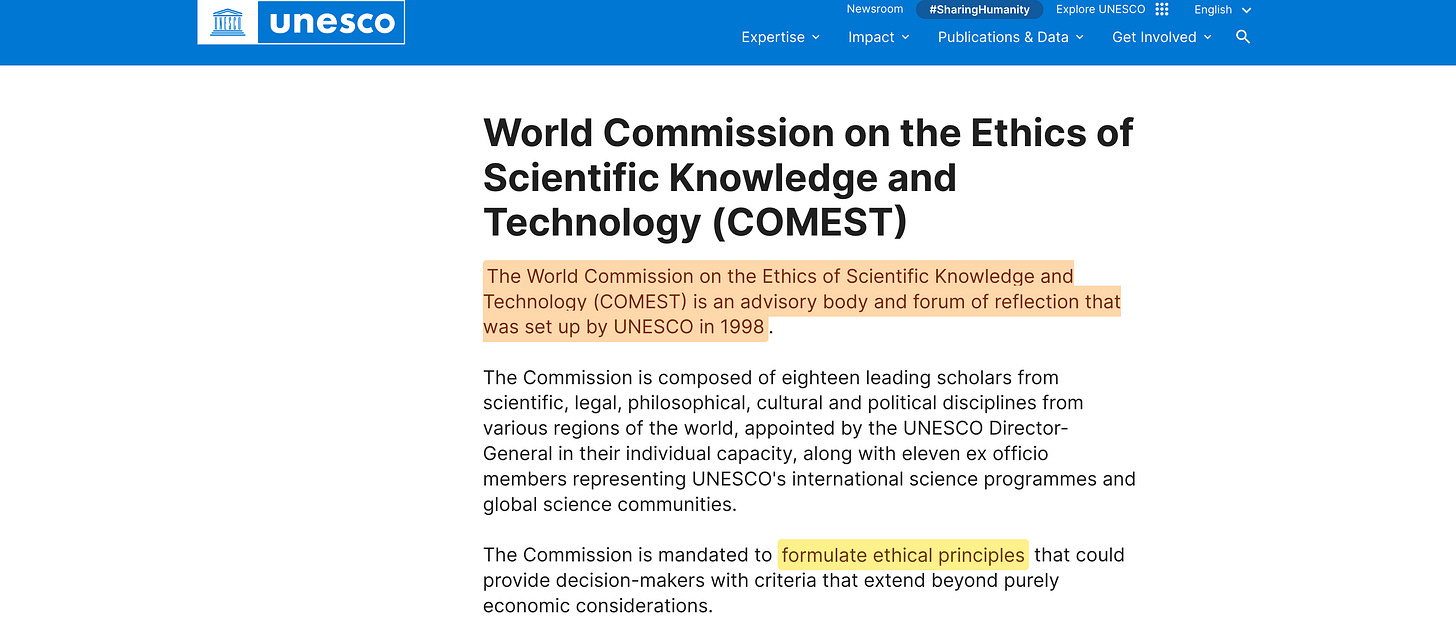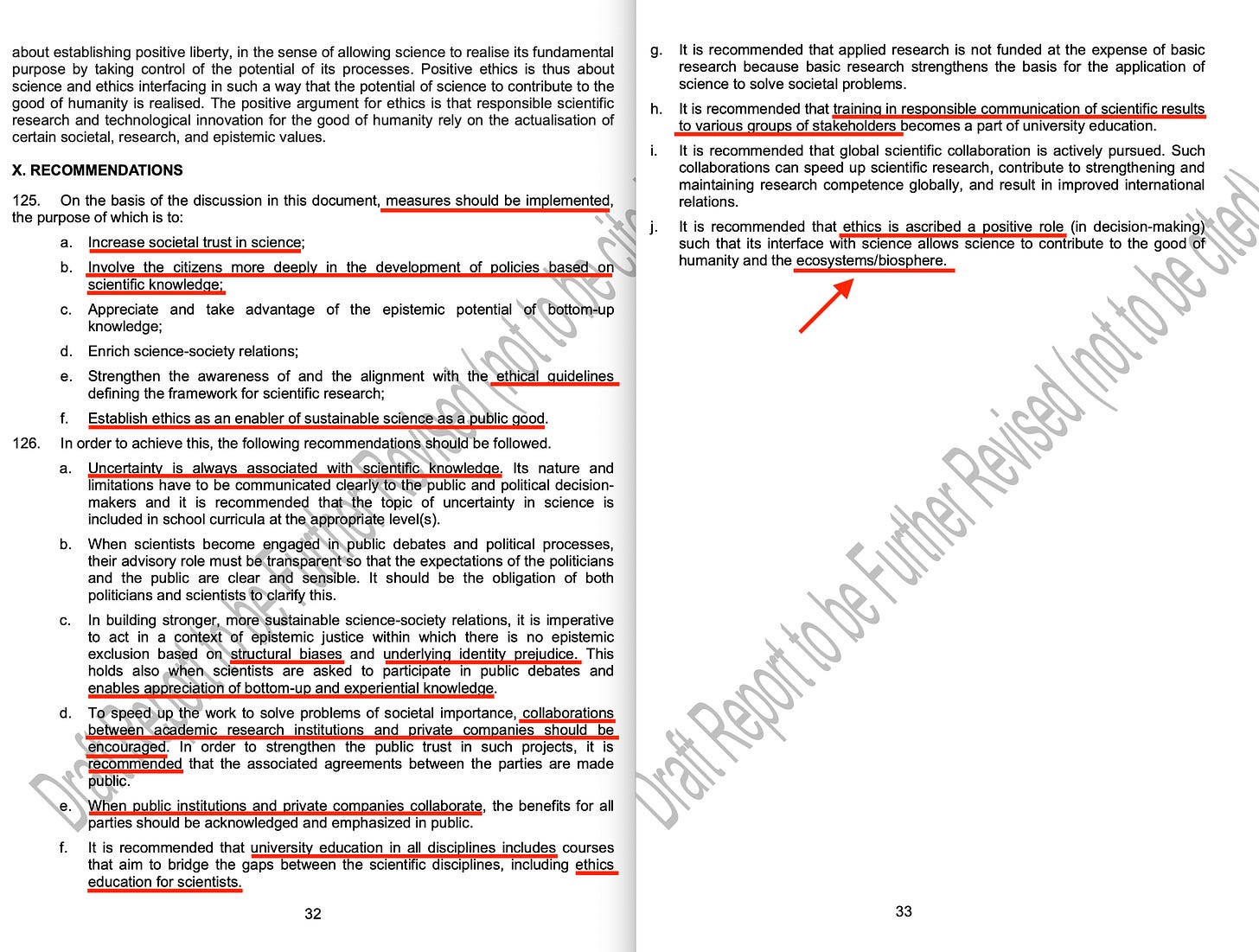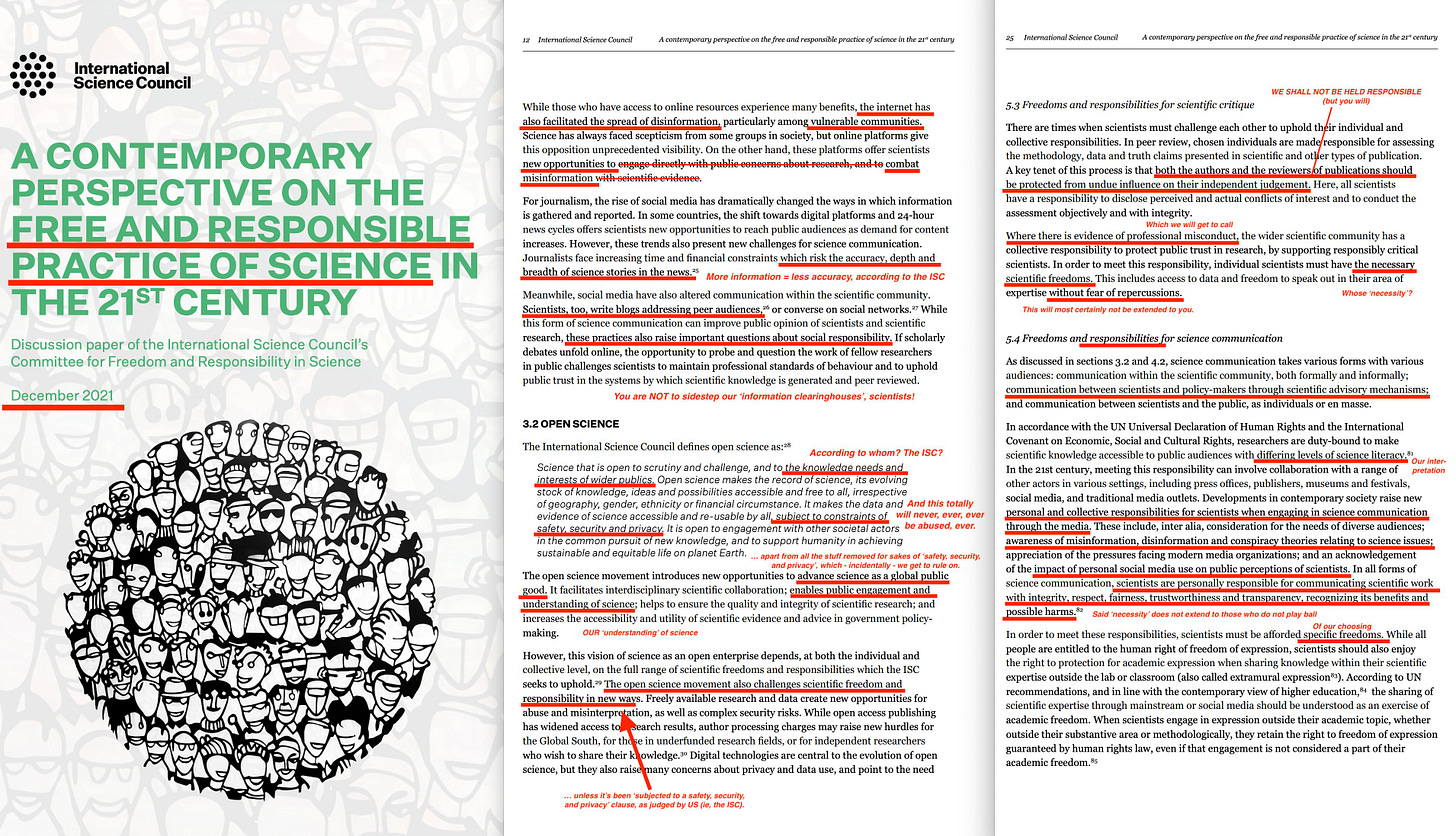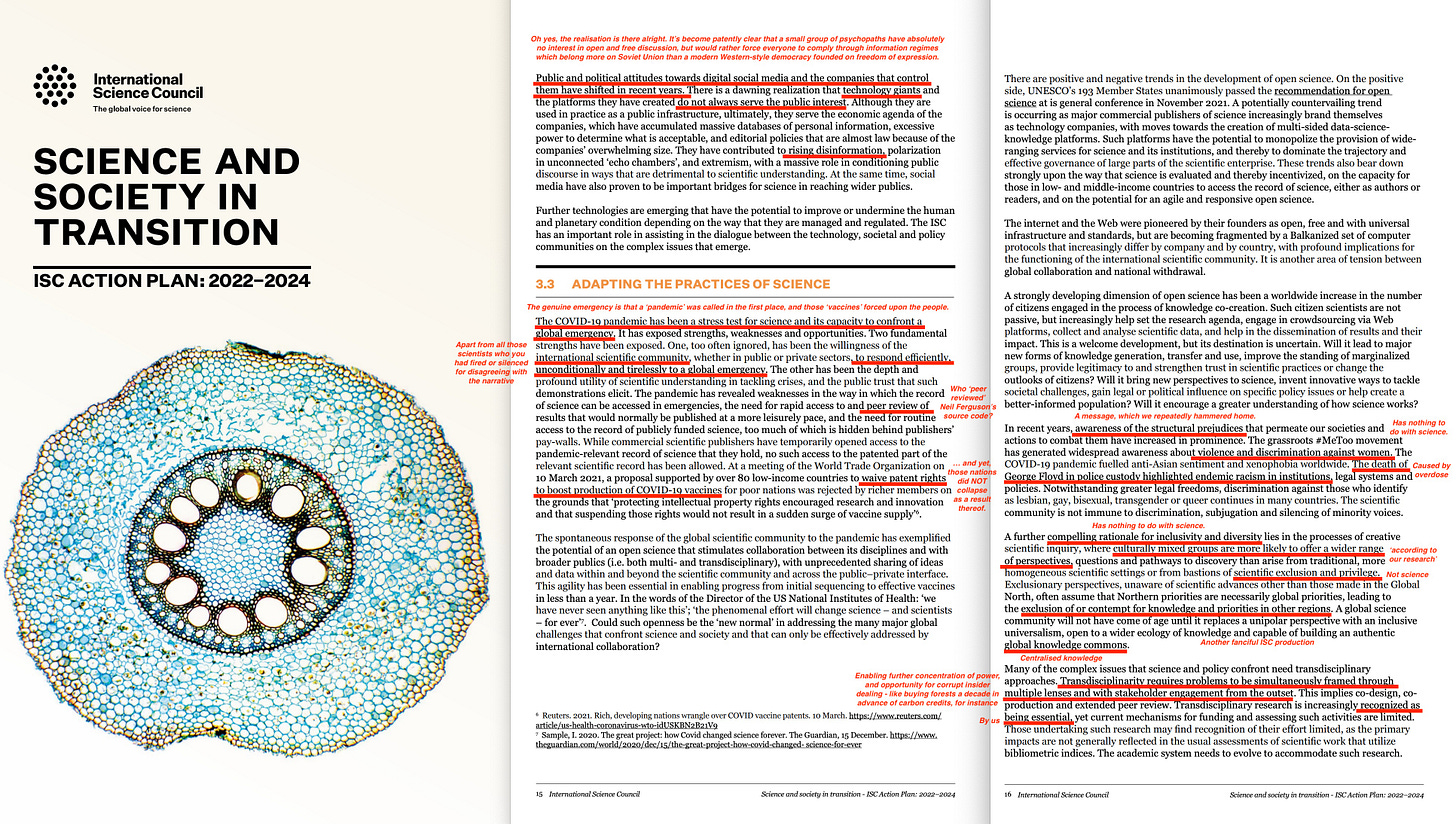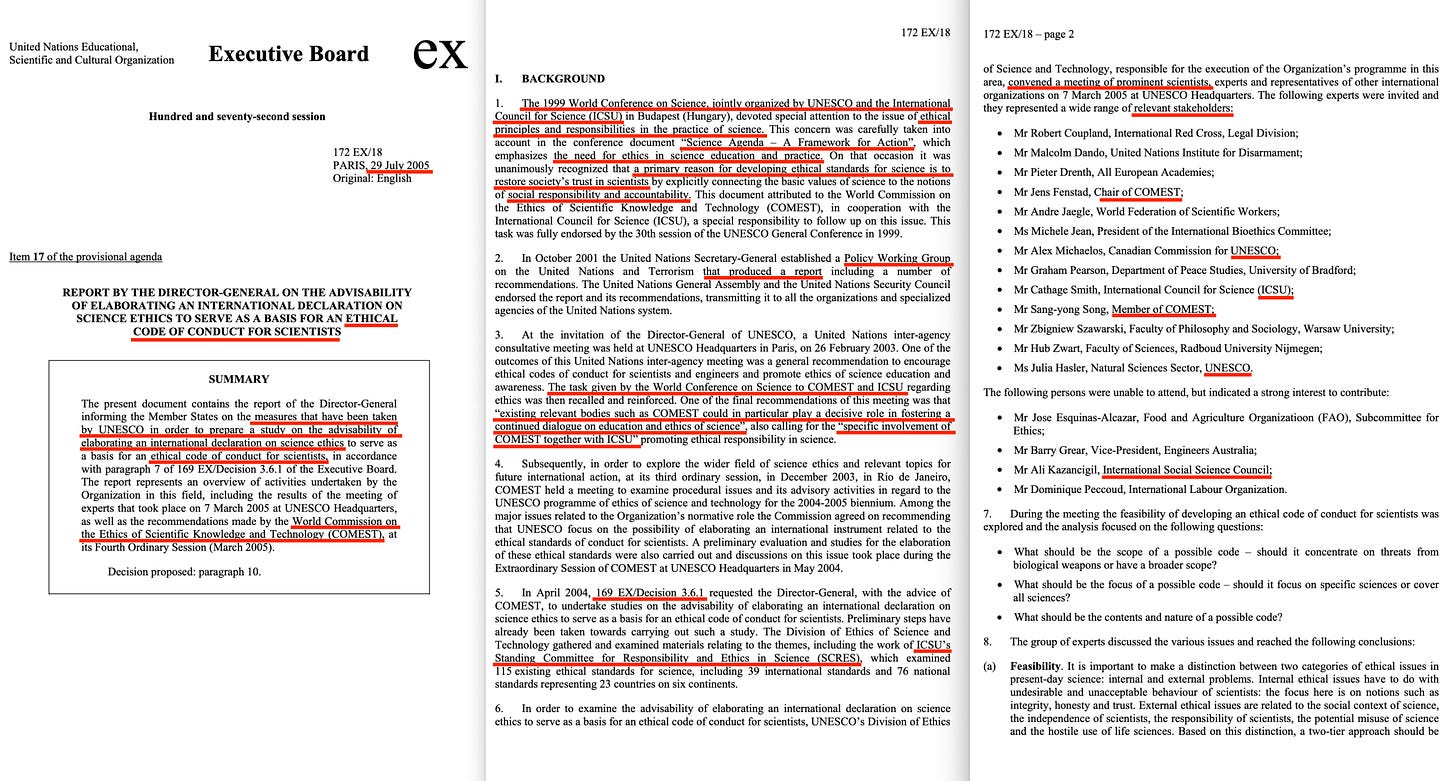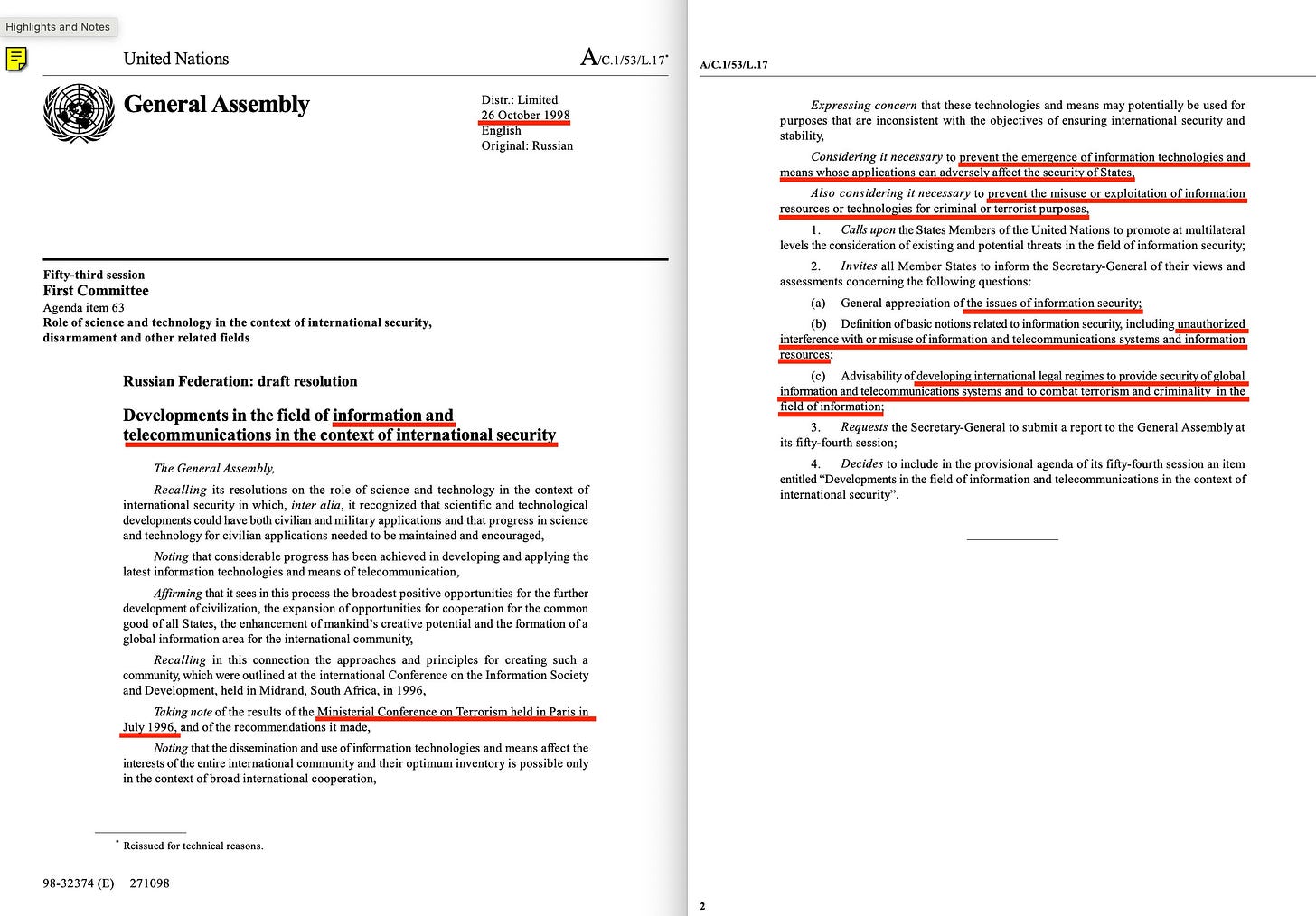Ethics of Scientific Knowledge and Technology
I don’t know if the below quote is real
But it fairly accurately describes what UNESCO and the ISC are presently up to.
I thought I’d give Twitter a break and for a change publish over there, rather than here. But - as per usual - within 30 second of posting something controversial, everything just goes quiet.
But then, in this case there’s a good reason. Because the document in question is… how should I put it… fairly indicative that we’re inching ever closer to living with Soviet Union levels of lies, through and through.
The document can be located here. It’s a draft report by UNESCO’s COMEST, incidentally launched a few years after ICSU’s similar SCRES. Yes, really.
Here’s ICSU (who have since changed name to ISC).
And here’s UNESCO’s COMEST.
Oh you claim there’s some absolutely marginal difference? Let’s have a quick look at the ICSU document again - ‘ICSU is represented on COMEST‘.
And from a bit further down UNESCO’s page -
… you were telling me something about a difference?
The paper was released in August, 2023, and is titled ‘DRAFT REPORT OF THE WORLD COMMISSION ON THE ETHICS OF SCIENTIFIC KNOWLEDGE AND TECHNOLOGY (COMEST) ON REVISITING THE RELATIONS BETWEEN SCIENCE AND SOCIETY IN THE LIGHT OF THE COVID-19 PANDEMIC‘.
Let’s kick off -
‘Within the framework of its work programme for 2021-2022, the World Commission of UNESCO on the Ethics of Scientific Knowledge and Technology (COMEST) decided to address the topic of the ethics of science in society in the context of the COVID-19 pandemic.‘
I actually like these documents. Because the likelihood of them pinning their colours to the mast is high - otherwise why release the document in the first place?
Let’s skip to page 10, and the section on ‘Public-Private Collaborations‘ -
‘… public-private partnerships addressing the emergency and developing effective mitigation strategies. Most notably, various consortia have been quickly formed between pharmaceutical companies and research institutions that aimed, with the support of national government and international bodies, to develop vaccines‘
Which effective mitigation strategies?
It’s telling, because they will absolutely stick to the script. It’s critical. If they don’t, they’d have to own up to their infallible institutions being as politicised as the case is.
And those consortia, yeah, funny how they could totally design a vaccine in a matter of days. Absolutely ludicrous that was.
‘In the case of COVID-19 vaccines, the public-private collaborations, including the use of new messenger RNA (mRNA) technology in the Pfizer-BioNTech vaccine, which was originally developed years ago in part by public funding, proved highly effective in quickly developing new solutions. However, they also highlighted the perils involved, as addressed in UNESCO’s ethics commissions’ call for global vaccine equity and solidarity (2021).‘
Those vaccines - best case - did not do a damn thing, apart from padding the bottom line of some of the more ethically questionably corporations on the planet.
And all that ‘vaccine equity’ was absolutely not an organic argument. It’s again - at best - a self-serving argument used to pad a bottom line. That’s best case.
‘It became apparent that new solutions are needed to govern Intellectual Property Rights in public-private collaborations that avoid socialising investments and risks while privatising profits and limiting fair accessibility of important innovations by the public.‘
The scamdemic pretty much kicked off with vdLeyen handing Pfizer a blank cheque and then destroyed the evidence - with absolute impunity.
It’s just lies, lies, lies, lies, lies.
Now onto page 12, and ‘COVID-19 AND THE URGENCY OF SCIENCE‘
‘The COVID-19 pandemic shall be recognized as one of the dramatic events in human history, owing to its far-reaching and mainly negative impact on health, economy, and livelihood.’
It’s just shameless. And even more shameless is that this goes unchallenged.
’At the same time, however, the crisis has provided us with an opportunity to rethink, reconsider and revamp aspects of our social structure, including the direct impact related to the ever-increasing realisation of the importance of science and technology.’
The Great Reset, no?
And no, but rather the importance of shoving through a technocracy. Because that’s ultimately the aim here.
’It became evident that the preferred way to pass through the pandemic was through scientific interventions and embracing science-based informed policies.’
It’s just non-stop lies. Seriously, apart from the Branch Covidians, who the hell is legit thinking in this way? Virtually nothing they told us in official capacity was true.
’This development is now reshaping science policies, scientific engagements, and international scientific collaboration.‘
In other words, the corruption and attempted destruction of democratic ideals will accelerate on basis of the scamdemic - which they fabricated.
‘Different countries and regions are now moving towards the institutionalisation of science diplomacy, which can have fruitful results in terms of research and development, science and technology innovation, and national capacitybuilding‘
There’s that budding technocracy again.
‘An important lesson from the COVID-19 pandemic was to cultivate a scientific practice which is based on mutual and multilateral collaborations embedded in the essence of diversity, equity, inclusivity, pluralism, and collectivism, beyond any regional, racial, and ethnic preferences‘
And there are those shameless lies again, with a chaser of collectivism.
They are trying to push through a technocracy.
Now, let’s skip to page 19, and TRUST.
‘The pandemic has highlighted the need for a renewed reflection on the nature and roots of trust in science to rethink the value of science for society, as well as the values driving science as a public good‘
Trust has taken a beating, but they still push for a technocracy, and the public good part is practically cut and pasted from an ICSU mission statement.
‘To keep the public well informed, scientists are responsible to communicate scientific results and science-based viewpoints in an accurate, transparent, and accountable fashion. In doing so, it is important to realise that modern technologies provide enormous opportunities, but also threats to proper science communication.‘
This, in effect, is telling those scientists to be careful about using social media.
‘The pandemic has challenged the integrity and freedom of science in several ways…, the growing public visibility of scientists has made them more vulnerable to intimidation and aggression, which sometimes result in self-censorship and reluctance to take part in societal discussions and share their findings and insights‘
Yet, they had absolutely no issue with censoring those with whom they disagreed, even going to the extents of discriminating against, or even having fired for doing the very job genuine, legit scientists are support to do - asking the question ‘why’!
‘At the same time, the pandemic has shown that adequate funding for research can have impressive results‘
More self-serving lies. Who peer-reviewed Neil Ferguson’s source code?
‘On the other hand, it is necessary to note that uncertainty is always part of scientific practice – and in fact of good scientific practice – and in this sense, retractions prove that scientific processes are working.‘
Excellent - in that context, please explain the quote “TRUST THE SCIENCE”. Because that was the one-liner, pushing those ‘vaccines’.
‘The credibility of science relates to establishing trust in science by analysing and mitigating public controversies where distrust impedes deliberative decision-making and limits the public benefits of science.’
You WILL trust the science. It’s to protect you!
’In this context, attention should be paid to the development of social science theories that explain why ordinary citizens may come to follow disinformation on science and how to bridge credibility deficits (Whyte & Crease, 2010).’
People don’t trust you BECAUSE of your Marxist social scientists.
’This will enhance resolution measures. (Please also see Chapter VII on the importance of science communication). In addition, it is imperative in the context of credibility to explain the role and scope of uncertainty in scientific progress and to ensure there is public understanding of the fact that the constantly tested nature of scientific knowledge is precisely what makes it credible, albeit within certain boundaries.‘
TAKE THE VACCINE, YOU REFUSENIK. TRUST THE SCIENCE.
‘The trustworthiness of science relates to the need of scientists to put trust in the data and products of one another’s research, i.e. in their colleagues’ professional performance and the processes of science‘
NO, scientists, you are NOT allowed to ask questions.
We continue with ‘COMMUNICATION AND THE SOCIETAL ROLE OF SCIENTISTS‘
‘In addition to publishing scientific findings and results through formal publication channels like scientific journals, books, and public reports, scientists have a responsibility to communicate their research to the public and engage in public discussions about problems where scientific knowledge is important to understand the issues and find good solutions. In this mediation, it is important that the presentations are accurate and the arguments transparent and that sensationalism is avoided.‘
Can you sense it coming?
‘Communicating scientific research became crucial during the pandemic. Citizens needed to understand elementary facts about the coronavirus, its circulation, the nature of the disease it can cause, and the effectiveness of measures like social distancing, mask wearing, testing, vaccination, and tracing/tracking applications.’
Yet, they lied about even the basics. Bats and a wetmarket, no? And social distancing did absolutely nothing, mask wearing was potentially harmful, testing was used to distort numbers, vaccination - give me a break, and the test-and-trace was overt persistent surveillance, GEMS/GEOSS style.
’At the same time, scientific uncertainties about the virus and the effectiveness of the measures taken against it needed to be communicated as well, both to the public and to policy makers.‘
They seek to institutionalise policy, yet accept absolutely no blame when it goes wrong. NO DEAL.
‘…also about becoming engaged in societal discussions and policy-making practices in an open and responsible manner‘
They did absolute none of those, continuously showed complete lack of respect, and policy-making was absolutely closed to the public, with politicians even refusing to entertain a public debate. These are just non-stop lies. In fact, everything in this document is a lie. Unfortunately, they’re about to ramp up -
‘Such engagements must be impartial and balanced, and it is important to present viewpoints in an accurate, transparent, and accountable way.’
Yey, they’re certainly not held to the same standard.
’This expectation is not always easy to live up to, and that is why the International Science Council (ISC) has prepared an advisory note on science communication (2016).’
Oh golly - ANOTHER fortuitous ICSU front-running incident!
’According to this note, it is the responsibility of the scientific community and individual scientists to communicate research results in an accurate, comprehensive, and considered way, especially when the results have an impact on human survival or well-being;’
It’s to protect you.
’to adjust the communication to the audiences and their level of understanding; to assist the media in correct reporting; and to strive to be accountable, reflect uncertainty, and avoid sensationalism.‘
Ie, individual scientists; do not speak up on anything. Anything you say can and will be used against you in a court of law.
‘Whatever the context is, it is important to realise that scientists are individually accountable for their communications, regardless of the audience… many issues are complex and often need to be addressed by scientists from other disciplines as well.’
Yup, microbiologists and GPs - better not speak up at all, or at least wait until the Marxist with the behavioural science degree has had her say.
‘However, even when that is done, scientists may even face criminal charges and consequently must stand up for scientific knowledge and principles in court.‘
DO NOT SPEAK UP.
‘The pandemic has intensified this issue and some scientists have been threatened and intimidated at an unprecedented scale for their advisory role on controversial societal measures to combat the virus, for instance the development of contact tracing apps, COVID-19 passes and certificates, vaccination policies, and lockdown policies.‘
I’m sure you now refer to the likes of Chris Whitty, who’s a tad more than ‘some scientist’. Granted, I don’t support any level of physical abuse, but even that is smearing it a bit thick. One rule for thee, but not for me.
‘Genuine concerns from citizens about the role science plays in policy-making need to be addressed in respectful and inclusive ways, in which these concerns are taken seriously and addressed with arguments and preparedness for discussion and debate. The role of misinformation in social media is a central obstacle in this context.‘
You did NOT address any concern with ANY level of respectfulness. And as for misinformation, you carried the lions share easily.
‘Scientists must be attentive to how their communications will be used... The COVID-19 period raised, in many countries, the question of privacy and human rights,‘
Yes, and for good reason.
‘One of the most influential tweets during the pandemic was from Australian virologist Eddie Holmes on 11 January 2020: “All, an initial genome sequence of the coronavirus associated with the Wuhan outbreak is now available at …” Within hours of this social media post, scientists around the world started developing vaccines, tests and studying the properties of the virus that subsequently caused the pandemic‘
Of all ‘scientists’, you pick Eddie Holmes??? It’s just breathtaking, this level of utter contempt of your fellow man.
‘However, social media has also brought new challenges and ethical concerns related to the communication and dissemination of scientific information. Social media platforms can be a breeding ground for misinformation, and it can be difficult to distinguish between credible and unreliable sources of scientific information.‘
Ah, there’s the call for ethics, after you’ve displayed none. As for distinguising, that’s where those ‘fact checkers’ come in, no? As in, those absurdly biased ones, sponsored by Johnson&Johnson and so forth, no?
‘The desire to be influential has brought new problems, as some researchers have … shared blatant misinformation. It is therefore important for scientists, … to fact-check information before sharing, and to be respectful of others in their interactions on social media. The scientific community needs to develop guidelines for the responsible use of social media in science and hold individual scientists accountable for any unethical behaviour.‘
More over-the-top self-serving commentry. One rule for thee, but not for me.
And as much as I’d like to waste my life commenting on Marxist social scientists putting their thoughts on ‘ethics’ in writing, let’s skip straight to the recommendations instead -
‘… measures should be implemented… Increase societal trust in science;‘
Trouble is, those ‘measures’ no doubt include doubling down on the problem.
‘Involve the citizens more deeply in the development of policies based on scientific knowledge;‘
… the citizens which THEY cherry pick, correct?
‘Strengthen the awareness of and the alignment with the ethical guidelines defining the framework for scientific research‘
THEIR definition of ‘ethics’.
‘Establish ethics as an enabler of sustainable science as a public good.‘
Marxist lies.
‘To speed up the work to solve problems of societal importance, collaborations between academic research institutions and private companies should be encouraged‘
… enabling corporations to corrupt even more scientific output.
‘It is recommended that university education in all disciplines includes … ethics education for scientists.‘
Again, THEIR definition of ‘ethics’.
‘…ethics is ascribed a positive role (in decision-making) such that its interface with science allows science to contribute to the good of humanity and the ecosystems/biosphere.‘
… which simply is not science. And biosphere? Like those UNESCO reserves you presently monetise?
Let’s have a look at a range of the other ‘BEST SCIENCE AVAILABLE’ documents courtesy of the ISC. Here’s the first one. I mean, self-serving or what -
'based on recognition of the ISC as the global go-to for independent, integrated scientific expertise, input and advice'.
They furthermore outright demand not to be called for their lies -'… an emergent, populist ‘posttruth’ stance on knowledge, and to the adoption of ideological or anti-scientific positions on topics such as climate change, genetically modified organisms (GMOs) and vaccination, that are diametrically opposed to and in conflict with the scientific consensus on these issues.'
They then carry on in the same vein, indirectly calling for ‘editorial norms’, aka ‘censorship’, though they will never admit it, precisely because they expect the ‘editorial policy’ to be dictated by…
In fact, I found rather a lot of their awful ‘best science available’ documents, which they no doubt never would entertain a debate on, precisely because they’re so obviously politically charged.
The bottom line here is that these people should never, ever, ever, ever, ever be close to the levers of power. Ever. Their material contain nothing but non-stop narrative conforming, yet exposed lies.
… and here’s a comment from their chair -
'... any technology can be misused, a core challenge for our species is to define forms of adaptive governance and regulation that would ensure society uses science and technology wisely'
Adaptive governance = arbitrary rule.
He furthermore also put out this statement, more than hinting at the technocracy they seek to push through -
I do, however, agree on the title of this ‘UNPRECEDENTED AND UNFINISHED‘, though I’m fairly sure we disgree on why that title is relevant.
Lots of global governance in that document, for the record. Along with this incessant belief that we’ll bridge the granularity of even the uncertainty principle, given sufficient quantities of global surveillance data -
Regardless - back to UNESCO. After all, that’s what the article is supposedly about. Already in 1999, they discussed ethics in science.
But what strikes me as a tad odd, perhaps a bit worrying even, is this resolution from 1998, issued by Russia -
‘Considering it necessary to prevent the emergence of information technologies and means whose applications can adversely affect the security of States,’
‘Also considering it necessary to prevent the misuse or exploitation of information resources or technologies for criminal or terrorist purposes,‘
… what exactly does that entail, precisely?
Because in 1945, the chap who inserted the ‘S’ into ‘UNESCO’, also started the progressive turn of the ISCU focal point from supposedly ‘hard science’, to one, cultimating with a 2017 merger between the ICSU and the ISSC.
The ‘hard science’ organisation eventually went soft.
Women hate it when that happens.






